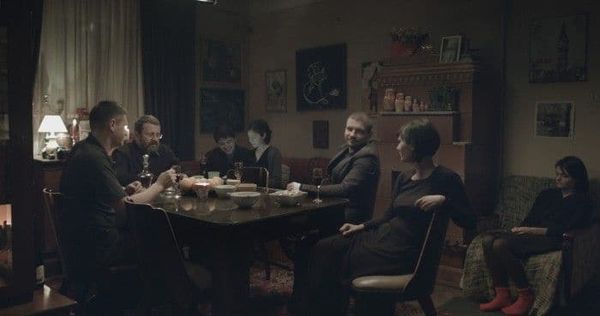Eye For Film >> Movies >> Illegitimate (2016) Film Review
Illegitimate
Reviewed by: Jennie Kermode

At the time of writing it's nearly three decades since Nicolae Ceaucescu's regime held power in Romania, yet his influence remains. Adrian Sitaru's deliberately provocative drama opens with an argument. Patriarch Viktor (Adrian Titieni) - who will be absent for most of the film but who casts a shadow over everything - reveals, in the middle of a family meal, that as a doctor under the old regime he prided himself on stopping women from having abortions. Horrified, his children bring up arguments familiar in the moderns world: that one cannot prevent abortions, one can only prevent safe abortions, and so on. But the film isn't concerned with the discussion itself. More significant is the way it crumbles, shockingly, to give way to a fist fight; likewise, the unguessed-at significance it will assume on account of the events that follow.
There is no new sin in this film. Everything has deep, stubborn roots. Twins Sasha (Alina Grigore) and Romeo (Robi Urs) have been sexually involved with one another for some time. Their situation is introduced almost in passing, and seems little more than a consequence of keeping a large family in a small house, something that the two have drifted into without giving it much thought. When Sasha finds that she's pregnant, however, thought is clearly needed. What follows is a tangled family tale in which expectations are turned on their heads and morals turn out to be far less rigid than they appeared. The audience is invited to engage in this too.

Through this fable, Sitaru explores numerous issues still weighing on wider Romanian society. Sasha and Romeo also face the challenge of being told their mother didn't want them, with Sasha later advised sympathetically that "there are different kinds of unwanted children" - the toll that having the mandated six took on women's bodies referenced several times. The social focus of a society still heavily orientated towards youth is illustrated both through the family relationships and in a scene where the twins go out clubbing, with further little-reasoned decisions precipitating another crisis. Older brother Cosma (Bogdan Albulescu) has pulled himself free of this to some extent, becoming a doctor and living a lifestyle that might be found anywhere in Europe, but he struggles to define his masculinity in relation to his father's. Yet where there is discord, there is also love, or at least a longing for it, and Sitaru breaks with the pattern of other recent films looking at these issues by addressing more directly the possibility of redemption.
Shooting in small rooms, in busy domestic spaces and a crowded nightclub, Sitaru creates a sense of being always in a crowd, so that collisions, whether sexual or violent, seem almost inevitable. The lighting is often harsh and the set decoration effectively captures the clash between the pre-(counter)revolutionary and the modern. Despite the incursion of modernity, Sasha still finds herself sidelined by men for much of the film, her situation treated by others as if it were primarily their concern, but this clearly clashes with a well developed sense of self, for all that she sometimes submits to it. Sitaru positions the actors well to illustrate this less direct form of conflict. There is no room here for any sense of closure, any true moral resolution - only a recognition of ongoing change.
Reviewed on: 23 Jan 2017
















